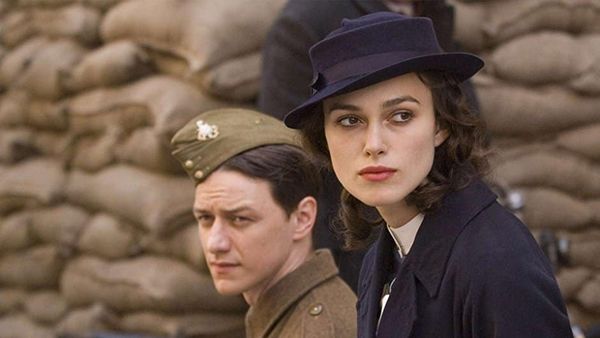Eye For Film >> Movies >> Atonement (2007) Film Review
Atonement
Reviewed by: Chris

If you are looking for another review to tell you how Atonement is the best acted, best adapted, best costumed (and so on) movie of the year, please stop reading. I don't disagree with that. I simply feel duty-bound to tell you why it is still a bad movie.
Atonement is a period piece, set in 1935 and onwards. It follows the life of Briony Tallis (played by three actresses in the course of her life, including Vanessa Redgrave). We see how her error of judgement destroys the lives of at least two other people. She never does actually 'atone' for her wrong, although she ultimately finds a way of telling a second lie, more openly, to do the best she can in her own head. Excessively high production values, superlative acting, and a generally interesting story, blind to us the moral bankruptcy of our tale. A tale that has moral values as its focus. We come out of the cinema saying how interesting it was. But have accepted complicity in the same errors it purports to address.

Cecilia Tallis (Kiera Knightley) lives a life of wealth and privilege in her family's gothic mansion. She is having a tempestuous affair with Robbie (James McAvoy), the housekeeper's son. Cecilia's younger sister, Briony, is still a child. But Briony is at that cusp where hormones start to play havoc. She has been raised in a typical atmosphere of sexual hypocrisy. With an imagination informed more by her precocious skill as an author and playwright than by any understanding of humanity, she is only too ready to believe that most sex is evil. (Sex from a commoner is probably worse.) It is not long before some indiscretions on the part of Cecilia and Robbie allow Briony to form a wicked picture of the young man.
When Briony witnesses a genuinely horrific sexual act, she makes a false accusation against Robbie. The power structures of wealth and class soon close ranks with Briony. She spends the rest of her life not only screwed up by Victorian values, but by her own over-arching sense of guilt for what she has done. The real victim of the crime - and real perpetrator - are tidied up as mere plot loose ends.
I have not read the book and cannot comment on whether the original novel is as hypnotic, glossy - and essentially vacuous. But I am given to understand that Ian McEwan is happy with the screen version.
Like a modern Lady Macbeth (there is a rather overly obvious hand-scrubbing reference), Briony is unable to assuage her guilt. And like the very power-forces that gave her childish lie such strength, the wealth, skill and moral righteousness thrown into this movie con us into believing it is anything but superficial. The acting is faultless. I have been critical of Knightley in her Pride And Prejudice Oscar-nominated role, but here she does clipped, slightly stroppy Cecilia to perfection. Much of the lauded talent from that earlier film has been reassembled. And it is almost as if they are having another shot at the Oscars they narrowly missed before (acting, costume and art direction) and a few more. The middle section (focusing on Dunkirk) has many 'Oscar worthy' moments, such as when lovesick Robbie/McAvoy is silhouetted against a cinema screen kiss. Or the long panning shot of the desolate battlefield that mirrors his inner desolation. But they are done self-consciously: the screen silhouette, for instance, is repeated (in case we didn't get the significance the first time?) By the end of Act Two I was convinced that the filmmakers were not going to let a lack of anything constructive to say get in the way of a good Academy attempt. We are invited to marvel at the film's elegiac quality. Indeed, there is much to admire. But its self-conceit goes on for a rather long time. And at the end, blame has been placed in all the wrong places. It even hints that, as a last resort, stories are better than the truth.
Reviewed on: 09 Sep 2007


















